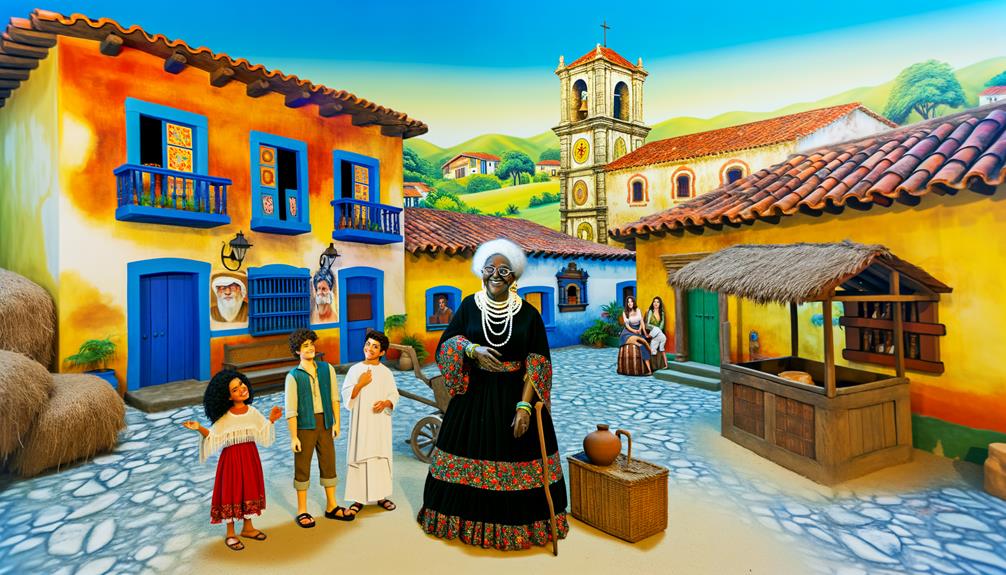Jose Name Meaning and Origin
The name Jose, derived from the Latin 'Iosephus' and Greek 'Ioseph,' finds its origins in the Hebrew 'Yosef,' signifying "God will add" or "increase." It holds deep biblical significance, associated with the patriarch Joseph, symbolizing faith and divine favor. Diverse cultural variations across Spanish, Portuguese, and Latin American traditions reflect its adaptability.
Throughout history, its popularity has fluctuated, seeing notable surges in the 19th and late 20th centuries, influenced by migration and pop culture. Prominent figures bearing the name emphasize its widespread impact.
To gain a richer understanding, explore the name's historical and cultural journey further.

Key Takeaways
- The name Jose originates from the Latin 'Iosephus' and Greek 'Ioseph,' derived from the Hebrew 'Yosef.'
- In Hebrew, 'Yosef' means 'God will add' or 'increase.'
- The name has strong biblical roots, associated with Joseph, a key patriarchal figure known for faith and divine favor.
- Jose is widely used in Spanish, Portuguese, and Latin American cultures with variations like 'José,' 'Pepe,' and 'Zé.'
- The name Jose remains popular due to its historical significance, cultural integration, and continued relevance in modern contexts.
Historical Roots
The name Jose, originating from the Latin form 'Iosephus' and the Greek 'Ioseph,' has its historical roots deeply ingrained in ancient Hebrew traditions, specifically from the name 'Yosef.'
This etymological journey commences with the Hebrew Bible, where 'Yosef' signifies 'God will add' or 'increase.' Over centuries, the name evolved through linguistic adjustments, reflecting the impact of various cultures and languages.
During the Roman Empire, 'Iosephus' emerged as a Latin representation, subsequently transforming into 'Jose' in Spanish-speaking regions. This historical progression highlights the flexibility and enduring appeal of the name across different eras and societies.
The name Jose embodies a diverse tapestry of linguistic development, showcasing the interconnectedness of ancient and modern cultures.
Biblical Significance
In examining the biblical significance of the name Jose, one must consider its origins in the Hebrew Bible, where 'Yosef' is prominently featured as a key patriarchal figure whose life story embodies themes of faith, perseverance, and divine favor. Joseph, the son of Jacob, known for his coat of many colors, rose from slavery to become a powerful leader in Egypt. This narrative underscores the importance of resilience and trust in divine providence. Below is a table of Joseph's key life events and their emotional impact:
| Event | Description | Emotional Impact |
|---|---|---|
| Betrayal by brothers | Sold into slavery by his siblings | Despair and betrayal |
| Rise to power in Egypt | Becomes Pharaoh's advisor | Triumph and hope |
| Reunion with family | Forgives and reunites with brothers | Forgiveness and joy |
| Preservation of Israel | Saves his family from famine | Gratitude and relief |
These events emphasize the profound spiritual and emotional dimensions associated with the name Jose.
Cultural Variations
The name Jose exhibits notable variations influenced by distinct cultural contexts, particularly within Spanish and Portuguese-speaking regions.
In Spain, traditional naming customs often pair Jose with other names to form compound names, whereas in Portuguese culture, the name retains unique phonetic and orthographic features.
Additionally, Latin American countries have adapted the name Jose to reflect local linguistic and cultural nuances, contributing to its diverse representations across the Spanish-speaking world.
Spanish Naming Traditions
Spanish naming traditions are deeply rooted in historical, religious, and cultural contexts, reflecting a rich tapestry of influences and practices. These practices are characterized by a detailed and structured approach to naming conventions, often involving multiple elements that signify various aspects of identity and heritage.
Key elements include:
- Double Surnames: Spanish individuals typically use both their paternal and maternal surnames, ensuring lineage representation from both sides of the family.
- Religious Names: Many Spanish names have religious origins, particularly from Catholic saints and biblical figures, highlighting the historical significance of religion.
- Compound Names: Combining names to form compound first names is common, offering a unique personal identifier.
- Patronymic and Matronymic Conventions: Names often include elements derived from the names of ancestors, preserving familial and generational links.
This multi-faceted approach underscores the cultural importance placed on names in Spanish society.
Portuguese Influences on Jose
Exploring the Portuguese influences on the name Jose reveals significant cultural variations that contribute to its unique identity in Lusophone contexts.
Within Portuguese-speaking regions, Jose is not merely a given name but a cultural symbol bearing historical and religious connotations. The Portuguese pronunciation, [ʒuˈzɛ], differentiates it from its Spanish counterpart, enhancing its distinctiveness.
Additionally, the use of diminutives such as 'Zé' and affectionate forms like 'Zezinho' reflect the intimate and familial associations tied to the name.
Historically, the name's prevalence in Portugal can be linked to the strong Catholic heritage, honoring Saint Joseph. This cultural embedding has fostered a deep-rooted respect and continuity, allowing Jose to remain a prevalent and cherished name in Lusophone societies.
Latin American Variations
In Latin American countries, the name Jose exhibits a range of cultural variations that reflect the region's diverse historical and social influences. These variations are influenced by indigenous languages, colonial history, and contemporary societal trends.
Here are four notable variations:
- José: The standard Spanish form, widely used across Latin America.
- Pepe: A common diminutive in Spanish-speaking regions, often used as an affectionate nickname.
- José María: A compound name, popular in countries like Mexico, blending religious reverence with cultural specificity.
- Zé: A colloquial version in Portuguese-speaking Brazil, demonstrating linguistic adaptation.
These variations emphasize how the name Jose has been integrated into different cultural contexts, maintaining its core identity while adapting to local norms and traditions.
Popularity Over Time
The popularity of the name Jose has exhibited significant fluctuations over time, influenced by historical trends and geographical factors. Analyzing these patterns provides insight into regional differences and the impact of cultural dynamics, including notable references in popular culture.
Historical Popularity Trends
Jose's popularity has fluctuated significantly over the centuries, mirroring broader social, cultural, and demographic shifts. Analyzing historical data reveals several key trends:
- 16th-18th Centuries: The name gained prominence in Spanish-speaking countries, influenced by religious and royal figures.
- 19th Century: Jose experienced a surge in popularity, particularly in regions with significant Catholic populations.
- Mid-20th Century: The name saw a decline in Western countries, correlated with broader trends towards diversified naming practices.
- Late 20th – Early 21st Centuries: A resurgence occurred, driven by increased Hispanic immigration and cultural integration in the United States and Europe.
These shifts illustrate how Jose's popularity is not just a matter of personal choice but is deeply intertwined with historical contexts.
Geographic Popularity Differences
While examining the geographic popularity of the name Jose, it becomes evident that regional cultural dynamics greatly influence naming trends over time. In Hispanic countries, such as Mexico, Spain, and Puerto Rico, Jose has historically been a prevalent name due to its biblical roots and cultural significance.
Conversely, in non-Hispanic regions, usage is less prevalent but noticeable within communities of Hispanic descent. In the United States, the name Jose saw a marked increase in popularity during the late 20th century, aligning with demographic shifts and increased Hispanic immigration.
The name's popularity in various states often correlates with the concentration of Spanish-speaking populations, reflecting broader socio-cultural patterns and migration trends that shape naming conventions across different regions.
Influential Pop Culture References
Examining the influence of pop culture on the name Jose, one can observe how figures in music, sports, and film have played a significant role in maintaining its popularity over time. This name has been perpetuated by diverse personalities, each contributing to its enduring appeal.
Below are notable examples:
- Jose Feliciano: An iconic musician whose global success has kept the name in the public consciousness.
- Jose Mourinho: A renowned football manager, known for his tactical genius, widely recognized in the sports world.
- Jose Altuve: A celebrated baseball player, who has garnered admiration and inspired many with his athletic prowess.
- Jose Ferrer: An award-winning actor whose distinguished career in film and theatre has left an indelible mark.
These figures underscore the name's enduring resonance in various cultural domains.
Famous Namesakes
Numerous eminent individuals bearing the name Jose have made significant contributions across various fields, including arts, sports, politics, and science.
In literature, Jose Saramago, a Nobel Prize-winning Portuguese author, is renowned for his profound works.
The world of sports boasts figures like José Mourinho, a highly successful and strategic football manager.
In politics, José Mujica, the former President of Uruguay, is celebrated for his humility and progressive policies.
Additionally, the field of science recognizes José Rafael Arboleda, a biochemist known for his groundbreaking research in molecular biology.
These distinguished namesakes exemplify the diverse arenas in which individuals named Jose have excelled, showcasing the name's widespread impact and enduring legacy across multiple domains.
Modern Usage
Building on the legacy of illustrious namesakes, the name Jose continues to maintain its popularity and cultural significance in contemporary society. This enduring appeal can be attributed to several factors: Firstly, the origin of the name Joseph can be traced back to biblical times, with the figure of Joseph being renowned for his wisdom and leadership. This biblical association has given the name a timeless and dignified aura. Additionally, the name has spread across different cultures and languages, further enhancing its universal appeal. Whether it’s the Spanish Jose, the Italian Giuseppe, or the French Joseph, the name continues to be embraced and celebrated worldwide.
- Cultural Integration: The name Jose is prevalent across various cultures, especially in Spanish-speaking countries, symbolizing a bridge of linguistic and cultural continuity.
- Prominent Figures: Modern celebrities and public figures named Jose contribute to its sustained relevance and appeal.
- Religious Significance: The name's biblical roots secure its continued favor among Christian communities.
- Global Migration: Increased global mobility has facilitated the widespread use of the name, making it a familiar choice in diverse regions.
This multifaceted significance highlights its enduring resonance and adaptability in modern contexts.
Conclusion
To conclude, the name 'Jose' weaves a rich tapestry of historical, biblical, and cultural significance, reflecting its enduring appeal.
Much like a resilient tree that adapts to different climates, 'Jose' has flourished across various cultures and epochs.
For example, its prominence in both Spanish-speaking countries and among biblical narratives underscores its versatile yet steadfast nature.
As a tribute to its enduring resonance, 'Jose' continues to be a popular choice, reflecting a blend of tradition and modernity.






